STORY HIGHLIGHTS
- Russian prime minister Vladimir Putin criticizes political boycott of Euros
- Says sport and politics shouldn't be mixed
- EU leaders boycotting event over jailing of former Ukrainian PM
- Supporters say charges politically motivated by current president
German chancellor Angela
Merkel has raised her concerns at Tymoshenko's treatment, while European
Union president Herman Van Rompuy, European Commission president Jose
Manuel Barroso and the governments of Austria and Belgium have all said
they will not be attending any matches in Ukraine in protest.
But Putin has waded into the row, telling journalists in Russia that sport and politics should be kept separate.
"In absolutely every
case, you can't mix politics, business and other issues with sport,"
Putin told Russian news agency Novosti.
"I stick to the principle professed and supported by the International Olympic Committee -- sport is outside politics."
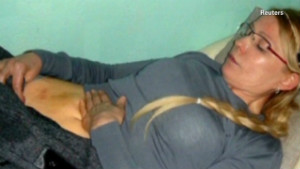 Tymoshenko claims beatings in jail
Tymoshenko claims beatings in jail
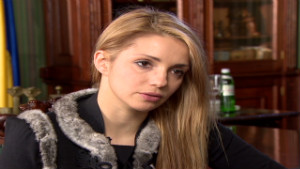 Daughter on Tymoshenko's jail ordeal
Daughter on Tymoshenko's jail ordeal
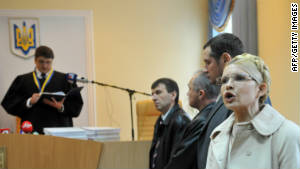 Former Ukrainian PM found guilty
Former Ukrainian PM found guilty
Putin's statement echoes the sentiments of Formula One chief Bernie Ecclestone, who defended the elite motorsport's decision to race in Bahrain last month despite widespread concerns over human rights issues.
Tymoshenko, the heroine
of the Orange Revolution that swept the country in 2004 and 2005, has
been in prison since last October for alleged abuse of office.
Her supporters claim that
the charges were politically motivated -- drummed up by current
president Viktor Yanukovych, who beat Tymoshenko in Ukraine's 2010
presidential election. It was alleged voter fraud by supporters of
Yanukovych during the 2004 presidential elections that originally
sparked the revolution.
Her party was expected to be a formidable foe in next October's parliamentary elections.
Last week pictures of
Tymoshenko released by her family appeared to show bruises she claims
came from a beating by a prison guard. She has since gone on hunger
strike in a bid to secure medical treatment she says she is being
denied.
Taking place a little
over a month before the Euro 2012 opening ceremony in Poland, which is
co-hosting the tournament, the row is just one of several controversies
that have threatened to overshadow what the Ukrainian government had
hoped would be a showcase event for the country.
Despite huge investment
in Ukraine's aging transport infrastructure, the country has struggled
in its preparations. Stadium delays had initially put Ukraine's hosting
of the tournament in jeopardy, but now new problems have emerged.
Hotel prices during the
tournament have risen so sharply due to profiteering that Michel
Platini, head of European football's governing body UEFA, was unusually
critical when visiting Ukraine last month for the opening of a new
airport terminal.
"It's annoying to have
made a lot of investment and then say to people that they can't come
because there are bandits and crooks who want to make a lot of money
during this Euro," he told the assembled press in Lviv.
You can't mix politics, business and other issues with sport
Vladimir Putin
Vladimir Putin
Security concerns were
raised when multiple bombs exploded in the city of Dnipropetrovsk, close
to Donetsk where the England team will be playing some of its matches.
More than 20 people were injured in the blasts. The authorities have so
far blamed criminal gangs rather than terrorists for the attack.
And earlier this week
Amnesty international warned football fans traveling to Ukraine that
they will face a "criminal" police force mired in so many abuse scandals
that its behavior threatens to ruin the showpiece tournament.
The Amnesty
International report "Ukraine: Euro 2012 jeopardized by criminal police
force" details how security forces have been implicated in numerous
cases of torture and extortion in cities due to host matches.
According to the report,
one recent case in the eastern city of Lviv -- where Germany, Portugal
and Denmark will play -- details how two men were beaten, robbed and
then imprisoned by six police officers after a disagreement in a bar.
Prosecutors originally
refused to open a criminal case until CCTV footage emerged of the
incident after one of the men's lawyers gave an interview to a local TV
station.
"The Ukrainian
government must take action now to stop widespread police criminality,"
said John Dalhuisen, Amnesty International's director for Europe and
Central Asia.
"Failure to do so will
encourage them to continue acting as a law unto themselves and put Euro
2012 fans in danger from a force that is out of control."
There are bandits and crooks who want to make a lot of money during this Euro
UEFA chief Michel Platini
UEFA chief Michel Platini
The Ukrainian foreign ministry responded to the avalanche of negative press stories this week in bellicose terms.
"The Foreign Affairs
Ministry considers destructive the attempts to politicize sporting
events, which have played an important role in the process of
establishment of intergovernmental mutual understanding and unity since
the earliest times," it said in a statement posted on the website of the
Ukrainian News Agency.
"The calls to boycott
the championship would in practice amount to undermining the image of a
grand sports event and damage to the interests of millions of ordinary
Ukrainians that vote for various political parties or are not interested
in politics at all."
Poland is split on the
controversy, with opposition leader Jaroslaw Kaczynski calling for a
boycott of the event and suggesting that matches be moved to Warsaw. But
president Bronislaw Komorowski dismissed those calls as
"inappropriate."
Meanwhile Merkel, a keen
football fan whose comments earlier this week on the fate of Yulia
Tymoshenko sparked the media furor, says that she will wait until the
very last minute to decide whether to attend the tournament.
"I always decide on such things at short notice," she told Koelner Stadt Anzeiger, a regional newspaper in Germany..

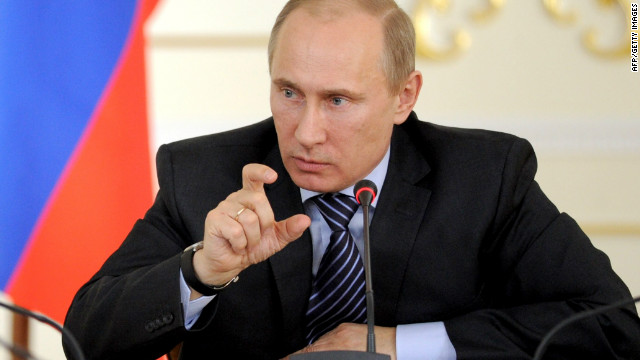 Russian prime minister Vladimir
Putin has spoken out against European leaders' boycott of Ukraine's Euro
2012 matches, saying sport and politics should not mix.
Russian prime minister Vladimir
Putin has spoken out against European leaders' boycott of Ukraine's Euro
2012 matches, saying sport and politics should not mix.
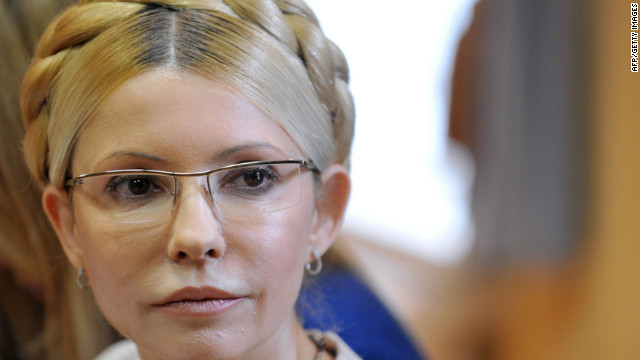 The plight of
Ukraine's former prime minister Yulia Tymoshenko, who has complained of
beaten in jail by guards, has led senior politicians to say they will
not attend Euro 2012 finals matches in the East European country.
The plight of
Ukraine's former prime minister Yulia Tymoshenko, who has complained of
beaten in jail by guards, has led senior politicians to say they will
not attend Euro 2012 finals matches in the East European country.
 Her husband
Oleksander (left) and their daughter Eugenia have been campaigning for
better treatment of the Orange Revolution leader, who was found guilty
of abusing her power when in office.
Her husband
Oleksander (left) and their daughter Eugenia have been campaigning for
better treatment of the Orange Revolution leader, who was found guilty
of abusing her power when in office.
 Germany's foreign
minister Guido Westerwelle said that concerns over Tymoshenko could
block ratification of a political and trade deal between the EU and
Ukraine.
Germany's foreign
minister Guido Westerwelle said that concerns over Tymoshenko could
block ratification of a political and trade deal between the EU and
Ukraine.
 Security fears for
the June 8-July 1 tournament in Ukraine and Poland have been elevated
since four explosions went off in a busy area of central Dnipropetrovsk
on April 27, wounding 26 people.
Security fears for
the June 8-July 1 tournament in Ukraine and Poland have been elevated
since four explosions went off in a busy area of central Dnipropetrovsk
on April 27, wounding 26 people.
 Police officers walk
past a giant model of "Tango 12," the official match ball of the Euro
2012 football tournament, during a patrol in Dnipropetrovsk on April 29.
No group has yet claimed responsibility for the bomb attacks.
Police officers walk
past a giant model of "Tango 12," the official match ball of the Euro
2012 football tournament, during a patrol in Dnipropetrovsk on April 29.
No group has yet claimed responsibility for the bomb attacks.






No comments:
Post a Comment